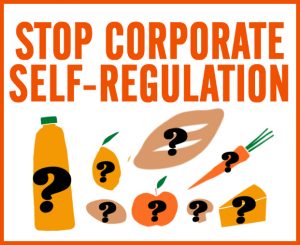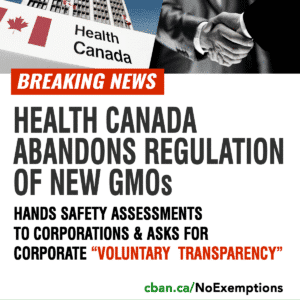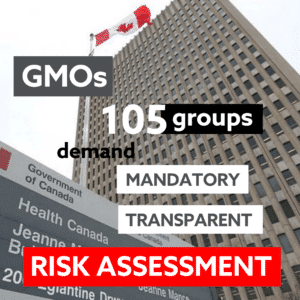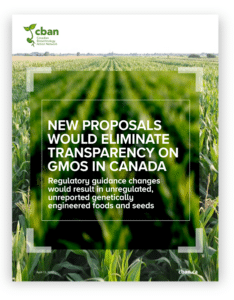Take Action: No Regulatory Exemptions
The federal government has removed pre-market regulation from many gene-edited foods and seeds, and livestock feed. This means that companies can release these genetically engineered (genetically modified or GM) organisms in the the food system and our environment without any government risk assessment and without notifying the government or public.
 Send an instant letter to your Member of Parliament and the ministers using the letter action in the green box on this page.
Send an instant letter to your Member of Parliament and the ministers using the letter action in the green box on this page.
Health Canada and the Canadian Food Inspection Agency (CFIA) should assess the safety of all genetically engineered foods and plants, including all gene-edited products, and should urgently establish mandatory registration of all genetically engineered products.
CBAN Briefing: Gene Edited Foods: Government oversight needed for safety and transparency, June 2025
Summary
Some genetically modified organisms (GMOs) produced through techniques of genome editing (gene editing) can enter the market without being assessed for safety by government regulators. They can also enter the market without any notification to the federal government.
There is no pre-market regulation for most gene-edited seeds as well as the foods derived from these genetically engineered (genetically modified or GM) plants. This means that some of these new genetically modified organisms (GMOs) can enter the market without being assessed for safety by government regulators. Instead, product developers can assess the food and environmental safety of their own gene-edited GMOs without government oversight, and without providing any notification to the government or public about their market release. The regulatory exclusion of many gene-edited products enhances safety concerns and comes at the expense of transparency and choice for Canadian farmers and consumers.
In 2022 and 2023, Health Canada and the Canadian Food Inspection Agency (CFIA) updated regulatory guidance on genetically engineered foods and seeds to exclude genetically engineered plants if they have no foreign DNA. These exemptions will apply to most (but not all) GMOs created with the new genetic engineering techniques of genome editing, also called gene editing. Plants that have no foreign DNA and the foods from those plants do not trigger the Novel Food Regulations or Part V of the Seeds Regulations:
- Most gene-edited plants, and the foods from those plants, are exempt from pre-market regulation such that there are no government safety assessments for human consumption or for environmental release. The federal government has handed safety assessments for these plants and foods over to product developers, with no government oversight.
- Additionally, the federal government is not requiring product developers to notify the government when they are releasing unregulated gene-edited foods and seeds onto the market. Instead, the government is “encouraging” companies to let the government know if they are selling new gene-edited foods and seeds. The federal government calls this “voluntary transparency”.
Corporate Self-Regulation
The new regulatory guidance results in corporate self-regulation of most future genetically engineered foods and seeds (genetically modified organisms or GMOs).
Multinational biotech and pesticide companies and their lobby group CropLife Canada have lobbied for an end to regulation because companies want easier, faster regulations for the new genetic engineering techniques of gene editing in particular. Click here to read what corporations were asking for.
 CBAN Press Release, September 27, 2023: Newly released e-mails show extent of industry influence over Health Canada decision to gut regulatory oversight of GM foods
CBAN Press Release, September 27, 2023: Newly released e-mails show extent of industry influence over Health Canada decision to gut regulatory oversight of GM foods
- Radio-Canada report: The Canadian Government Insists it is Independent of the Agrochemical Lobby
- Radio-Canada report: “Tiger Team”: When civil servants and lobbyists cooperate in the shadows
- CBAN Article: Corporate-Government “Tiger Team” Gutted GMO Regulations, Watershed Sentinel.
- CBAN Opinion article in The Hill Times – September 2023: New regulatory guidance sets up corporate self-regulation of GMOs
 May 3, 2023: The National Research Council of Canada (NRC), a Crown corporation, has teamed up with the agrochemical industry lobby to inform the public about genetically modified seeds as the federal government prepares to announce a controversial seed reform on Wednesday. The choice of speakers has been criticised as almost all of them have an interest in the industry. Read the article.
May 3, 2023: The National Research Council of Canada (NRC), a Crown corporation, has teamed up with the agrochemical industry lobby to inform the public about genetically modified seeds as the federal government prepares to announce a controversial seed reform on Wednesday. The choice of speakers has been criticised as almost all of them have an interest in the industry. Read the article.
Press Release – May 3, 2023: Federal government allows biotechnology companies free reign in the food system, removes safety checks on corporate science and denies transparency to farmers and food companies
Updates
December 2, 2024: A US judge has overturned US regulatory exemptions for some GMOs, forcing the US Department of Agriculture to revert to 2020 regulations. Click here to read the press release from the plaintiffs.
May 3, 2024: The Canadian Food Inspection Agency published new regulatory guidance that frees companies to sell livestock feed from gene-edited products (those with no foreign DNA) without government safety assessments or other government oversight.
October 19, 2023: Joint letter from SaskOrganics, National Farmers Union, CBAN and Vigilance OGM, Urgent need to reinstate safety assessments and transparency for all GMOs
CBAN Briefing to Members of Parliament – May 2023: Reverse New GMO Regulatory Guidance, to Ensure Safety and Transparency
May 3, 2023: The Minister of Agriculture and Agri-Food has approved changes to Canadian Food Inspection Agency (CFIA) regulatory guidance that, along with similar changes permitted by the Minister of Health in May of 2022, allow product developers to assess the safety of their own genetically modified (GM or genetically engineered) seeds and foods without government oversight. CBAN Press Release – May 3, 2023: Federal government allows biotechnology companies free reign in the food system, removes safety checks on corporate science and denies transparency to farmers and food companies
 March 6, 2023: The farmer-led organization SaskOrganics has called March 9, 2023, a Day of Action with the message “No Hidden GM Seeds“, to ensure transparency and traceability of GM seeds for organic farmers. “A mandatory list of all GM seeds is necessary so organic farmers can continue to farm organically. If biotechnology companies can hide GM seeds from farmers by leaving them off a voluntary registry, we won’t be able to protect our fields from genetic modification.” – Marla Carlson, SaskOrganics’ Executive Director.
March 6, 2023: The farmer-led organization SaskOrganics has called March 9, 2023, a Day of Action with the message “No Hidden GM Seeds“, to ensure transparency and traceability of GM seeds for organic farmers. “A mandatory list of all GM seeds is necessary so organic farmers can continue to farm organically. If biotechnology companies can hide GM seeds from farmers by leaving them off a voluntary registry, we won’t be able to protect our fields from genetic modification.” – Marla Carlson, SaskOrganics’ Executive Director.
January 24, 2023: The president of the Canadian Food Inspection Agency (CFIA) has resigned. This follows media revelations that biotech industry lobby group CropLife Canada authored a CFIA document that proposes to exempt new genetically engineered seeds from regulation. In October, the National Farmers Union, CBAN and 13 other groups asked for the president to be replaced.
November 29, 2022: Hundreds of farmers in the Prairies and across the country have sent seed packets in the mail to the Minister of Agriculture and Agri-Food. CBAN also send the packet to every Member of Parliament. The seed packets carry a message of warning that the sale of undisclosed GM seeds would threaten the future of organic food and farming. Click here to send your seed packet message to the Minister.
September 20, 2022: The Minister of Agriculture and Agri-Food is now pledging to ensure transparency and traceability of all GMOs. The Minister of Agriculture and Agri-Food now says, “The integrity of the organic certifications must be guaranteed at the end of the work and that is a very clear directive that I gave to the [CFIA]” and, “Automatically, there must be one way or another to ensure traceability, transparency.”
September/October 2022: An investigative report from French-language CBC has exposed that the biotechnology and pesticide industry lobby group CropLife Canada directly created a government document that proposes removing safety assessments for new genetically engineered seeds. The Canadian Food Inspection Agency (CFIA) presented a document outlining proposed regulatory exemptions for many new gene-edited seeds but the document was created by the corporate lobby group CropLife. Read the full story in French here or the English translation here.
 May 18, 2022: Companies are now free to assess the safety of some of their own genetically engineered (genetically modified or GM) foods, without any government oversight. Consumer, environmental, and farmer groups across Canada are denouncing an announcement from Health Canada that will allow private companies to release many new genetically engineered (genetically modified or GM) foods without any government safety checks. The federal government will now allow product developers to assess the safety of many new gene-edited foods (those with no foreign DNA) with no role for Health Canada regulators. Health Canada’s new regulatory guidance will also limit the government’s powers to simply asking companies to voluntarily notify the government of new gene-edited foods coming to market.
May 18, 2022: Companies are now free to assess the safety of some of their own genetically engineered (genetically modified or GM) foods, without any government oversight. Consumer, environmental, and farmer groups across Canada are denouncing an announcement from Health Canada that will allow private companies to release many new genetically engineered (genetically modified or GM) foods without any government safety checks. The federal government will now allow product developers to assess the safety of many new gene-edited foods (those with no foreign DNA) with no role for Health Canada regulators. Health Canada’s new regulatory guidance will also limit the government’s powers to simply asking companies to voluntarily notify the government of new gene-edited foods coming to market.
- Briefing for Members of Parliament, July 2022
- June 13, 2022: CBAN’s response to Health Canada’s public relations on GMO regulation
- May 18, 2022 – Press Release: Federal government abandons safety assessments and transparency for new gene-edited foods
- May 19, 2022 – Press Relase from SaskOrganics: Organic farmers raise the alarm at Health Canada’s new regulatory guidance on novel foods
April 2022: Poll results show Canadians oppose by a margin of nearly 2 to 1 (46% to 24%) the proposals to let companies conduct their own safety assessments of some GM foods produced through gene editing (those with no foreign DNA) rather than require independent regulators at Health Canada to assess safety. Click here to access the details.
April 13, 2022 – CBAN Report and Summary: New Proposals Would Eliminate Transparency on GMOs in Canada: Regulatory guidance changes would result in unregulated, unreported genetically engineered foods and seeds.
March 24, 2022 – Report: Unintended effects caused by techniques of new genetic engineering create a new quality of hazards and risks, report from CBAN and Testbiotech (Germany)
 December 15, 2021 – Opinion : “Health Canada proposes blind trust in the safety of GMOs”, Lucy Sharratt, CBAN, Opinion article, rabble.ca
December 15, 2021 – Opinion : “Health Canada proposes blind trust in the safety of GMOs”, Lucy Sharratt, CBAN, Opinion article, rabble.ca
December 9, 2021 – Health Canada did not announce its new regulatory guidance on December 8th as anticipated. This announcement could come at anytime, however many people are calling or emailing the Minister of Health to object: Add your voice by filling out the letter form on this page to send your letter to the Minister.
November 17, 2021 – 105 groups send letter to the Ministers calling for transparency and government oversight of all genetically engineered foods. Click here to read the letter and see the signatures.
Resources
All of CBAN’s reports and commentary documents on this issue are now posted in one place: Click here to access the full campaign library.
CBAN analysis:
- New Proposals Would Eliminate Transparency on GMOs in Canada: Regulatory guidance changes would result in unregulated, unreported genetically engineered foods and seeds, April 13, 2022 (Report in French)
- Briefing for Members of Parliament: Regulatory guidance proposals on gene edited foods and seeds, October 20, 2021 (Briefing in French)
- Summary of the regulatory guidance proposals, November 2021 (Summary in French)
- “Health Canada proposes blind trust in the safety of GMOs”, opinion article by Lucy Sharratt, CBAN, rabble.ca, December 15, 2021
CBAN responses to CFIA proposals on GM seeds regulation:
- CBAN’s comments submitted to the CFIA, Sept 7, 2021
- CBAN’s Guide to the CFIA Consultation, July 20, 2021
CBAN responses on Health Canada’s proposals on GM foods regulation:
- CBAN comments on Health Canada’s primer on gene editing, June 23, 2021
- CBAN’s comments submitted to Health Canada, May 11 2021
- Summary of CBAN’s comments to Health Canada, May 11 2021
- CBAN’s full Guide to Health Canada’s proposals, April 8, 2021
Government proposals and consultation documents:
The Canadian Food Inspection Agency consultation page is now closed.
Health Canada had two consultation documents that were available upon request:
- Proposed Changes to Health Canada Guidance on the interpretation of Division 28 of Part B of the Food and Drug Regulations (the Novel Food Regulations): When is a food that was derived from a plant developed through breeding a “novel food”?
- Proposed Health Canada Guidance on the pre-market assessment of foods derived from Retransformants under of Division 28 of Part B of the Food and Drug Regulations (the Novel Food Regulations)
Information on genome editing (gene editing):
- CBAN Factsheet – “Introduction to Genome Editing“
- CBAN Report – “Genome Editing in Food and Farming: Risks and Unexpected Consequences“
- GM Watch – List of recent studies: “Gene Editing: Unexpected outcomes and risks”
- www.cban.ca/gene-editing
Information on GMO regulation in Canada:
- CBAN Report – “Are GM Crops and Foods Well Regulated?“
- or see www.cban.ca/regulation





